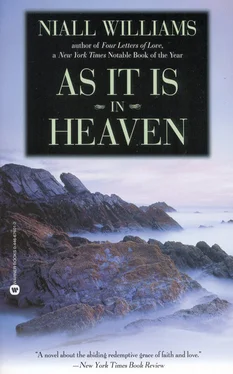Sonny Sugrue was waiting. He was reading a newspaper in the spin-around red-leather chair of his customers and following closely the case of a murder trial in California. He was a man of mostly stomach. That and his hairless head gave him a double roundness that he imagined were comment enough on his pleasure at the world. He had been a barber in Manchester, New York, and Chicago before the arrival of muffled speech like cottonwool in his ears signalled the beginning of his deafness and forced him to return to Kenmare, where he did not need to hear his customers’ requirements. His left ear heard nothing, and his right caught the distinctions of instructions only when his hearing aid was at full volume, something he considered an unnecessary waste of its battery. Sonny cut hair short, or off. When Stephen Griffin appeared in the doorway before him, he looked up from knife murder in California and smiled. There was cutting in this one, he thought.
Half an hour later Stephen’s hair lay on the floor, and he looked with surprise at the mirror to discover that the centre of his pate was almost entirely bald. When he raised his head he saw the curved limit of himself like a passing moon and was aghast.
“I’m bald,” he said.
Sonny Sugrue didn’t catch him. He was sweeping the hair into the corner.
“I look like a clown.”
Although he paused, Sonny missed the words as they passed him in the air, merely nodding the slow, wise nod of a man who had handled the heads of ten thousand, seen the vanity of youth, the diminishing of beauty, and the horror of age as the customer turned to the truth of the mirror. We are always a shock to ourselves.
“Five pounds, please,” he roared across the small shop.
It was a moment before Stephen moved; he was transfixed by the changed image of himself in the glass, and then gladly realized that as he was unrecognizable to himself, he could walk the streets of the town with no fear of the woman knowing him. When he reached the doorway he felt the warm day cool on the top of his head and stooped out beneath the jamb as if bearing eggs on his crown. A small bubble of joy inflated in his stomach.
He went across to Nelly Grant. When she saw the white dome of his forehead coming, her heart lifted and she told him at once that he looked much better, and remarked to herself the dark health of his eyebrows. “You’ll see,” she said aloud before he reached her. “Walk in the sun this week now, and eat plums. You’ll see.” She paused in that moment before friendship, then added, “I’m having a mug of tea, would you like some?”
She sat him in the small side room to the shop and poured a tea that was not Indian. It was green in colour and tasted like the wildflower and grass teas of children playing house in the summertime. She had concocted it herself while he was in Sugrue’s and now watched him drink. He has the embarrassment of those who feel deeply that they should not be alive at all, she thought, those who have survived where others who were better, more gifted or beautiful or true, have perished into death.
Stephen’s face collapsed in a scowl at the dregs of the teacup.
“You don’t have to finish it,” she said. “But it will do you good. You’ll see.”
Nelly Grant filled a bag of plums and gave them to him. She took his money and then watched him walk out the door, telling him she would have fresh supplies in by Friday.
And so Stephen began the week of his wait for Gabriella Castoldi in the town of Kenmare, where the sun shone like midsummer and the farmers drove their tractors in shirtsleeves. Blue skies hung like canopies above the green mountains. The white flecks of the winter sheep ran and kicked air like lambs as the pulse of a midwinter spring beat beneath the earth. Yellow blossoms reappeared on the gorse bushes that week. The crown of Stephen’s head burned pink, and for it Nelly Grant gave him oil that smelled like coconuts and induced the tropical dreams of warm seas and white sand that woke him with both eyes weeping saltily on his pillow. The town was lifted with the weather, as if a holiday had been declared without tourists. Nelly sold salads on the first of December, and fed Stephen Griffin the restorative fibrous lunch of raw carrots diced in muesli. Out of politeness he gagged mouthfuls of what seemed like horse food and listened to her telling him how his complexion had improved. He had begun to show a little of his life force, she told him. She had already detected that Gabriella Castoldi was the woman he was waiting for, but she did not yet know the extent of their relationship and imagined that at least they had met. Each sun-bright bedazzled day, while the flies buzzed back into Kenmare and the wild rhododendrons reglossed their leaves in the mountains, Nelly Grant plotted the return of Stephen Griffin to health; and he submitted. He was a textbook case, she thought, not that the characteristics of his symptoms bespoke a single remedy, but rather that the multiplicity of his ailments prompted Nelly Grant to consider giving him everything in the textbook. She gave him zinc for his skin and made comfrey tea, and then diced watercress in the salad sandwiches she made for him for his walks. For the anaemic condition which she feared was almost endemic to his character she gave him garlic and sunflower seeds, Brazil nuts and almonds, and offered him a soup of soya beans when he returned red-cheeked and pink-crowned from clambering all day in the lower slopes of the mountains. For the poorness of his respiration, a complaint common in uncertain lovers, she made a carrageen blancmange from the moss which was still growing in winter along the temperate shoreline of Parknasilla.
Four days was too short a time to change the habits of over thirty years, but Nelly was reaffirmed in her philosophy when she saw the clear improvements in the patient. Love, she knew, was simply the energy that bound us to the earth; and for it the energy of the earth needed to be administered. For love you need carrots, and Stephen Griffin collected four in a brown paper bag every morning before walking his lovesickness out into the green air of the mountains.
And so, that warm and close week of waiting. It was a week that Stephen had taken out of his life, as though he had torn the next page from a book and thrown the rest away, following the sentences down the page with no idea of what in the airy infinity behind it came next. Endlessly as he moved out into the mountains and walked the lower hillsides he read down the page to the end — how he had heard a woman playing in a concert, how it had moved him, how he could not stop thinking of her and had come now to Kenmare to see her again; it read as simply as an infant’s text. But in the moment he reached the bottom of that page the limitless possibilities beyond it made him ill with a sense of freefall and the notion that he was being absurd and should drive on back to Clare.
But still, at the moment when he might sensibly have left, he stayed on, his resolve fuelled at crisis moments and his balance restored by the hundred plums and the tropical summertime that had softened the air between the mountains of Kerry like a pair of hands tossing a light pastry. He stayed on, waiting. Mary White brought him boiled eggs in the mornings, and when he discovered her small tape recorder she joined him sometimes in the evenings when he listened to Vivaldi in the garden-looking sitting room, where the saffron crocuses were already blooming. He listened to the music with his hands on his knees and his head back on the armchair, his eyes closed. He wore a white shirt with the collar open that gleamed in the low light. By the Thursday evening sleep had deserted him, and long after Mary White was lying in the familiar dream of her husband in the garden with the straw hat on his head and their camellia in blossom; Stephen was lying wide-eyed on top of the covers, where the moon spilled like mercury, aware only that his life had reached a precipice, and holding in his hands the yellow page that announced the Friday-evening concert in the hotel, with Gabriella Castoldi on violin and Paul Sheils on piano.
Читать дальше











